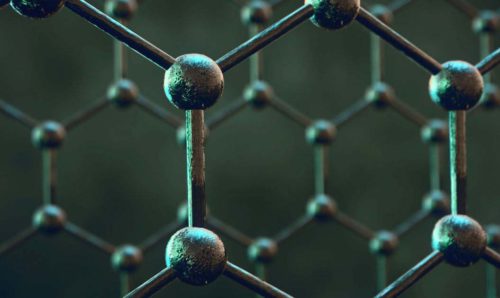Guest post: The Graphene Age’ – how Manchester is leading UK innovation
Our partners 9th September 2019
Manchester’s expertise in advanced materials – including the highly disruptive potential of graphene – will be showcased later this month at the Transatlantic Aerospace Symposium organised by British-American Business Connections and backed by multinational corporation Boeing, which will also feature the RAF’s Red Arrows team. Graphene and Manchester’s advanced materials expertise will also be part of the international innovation conference hosted in the USA called CAMX, which focuses on development in composites.
Here David Hilton, Head of Business Development at MIDAS, explains why Manchester has unique expertise when it comes to advanced materials.

“Greater Manchester is the UK’s largest city region outside London and both its history and its future are steeped in innovation. It is here where the first industrial revolution began, where the atom was split, the computer was born and, more recently, the ‘Home of Graphene’ was established – so it’s no wonder the saying ‘what Manchester does today, the rest of the world does tomorrow’ has been repeated countless times throughout the years.
Benefitting from diverse specialisms across manufacturing, digital and creative industries, life sciences and financial and professional services, Manchester is a magnet for global companies looking to innovate, particularly in advanced materials where Greater Manchester is truly world leading.
With a rich history of industry and academia working together to develop and commercialise composites, technical textiles, materials for demanding environments, coatings, light alloys and, most recently, 2D materials like graphene, it’s unsurprising that Manchester is the UK’s hub for advanced materials research, with The University of Manchester hosting prestigious facilities like the Henry Royce Institute, the Aerospace Research Institute, the National Graphene Institute (NGI), the National Composites Certification and Evaluation Facility, the BP International Centre for Advanced Materials and the recently opened Graphene Engineering Innovation Centre (GEIC – pictured above), which is a globally unique facility for industry to pilot, produce and commercialise graphene-enabled products.
But what is graphene? In simple terms, graphene is a single atomic layer of carbon. It was first isolated in Manchester by scientists Andre Geim and Kostya Novoselov, who were rewarded with the Nobel Prize for Physics for the achievement. Graphene’s properties led it to be dubbed a ‘wonder material’, as it is the strongest, stiffest and thinnest material yet known, and is electrically and thermally conductive, impermeable and transparent, so offering new possibilities across multiple applications.
In Manchester, a dedicated innovation community is working with industry to rapidly move from laboratory to pilot production to commercialisation – and this is what the GEIC was designed for. Industrial partners make use of the unique suite of pilot production equipment to prototype new applications and products, test them, prove them and launch them to market ahead of the competition.
Applications being explored include composite materials, new battery technologies, sensors, surfaces and coatings, printed electronics, biomedical applications, membranes and electronics.
Aligned to the coming of ‘The Graphene Age’, the UK government has highlighted Greater Manchester as the ideal location for companies to capitalise on the global opportunities around the lightweighting of transport – a sector worth £138 billion – over three years, which will deliver lighter automobiles, aircraft and trains for our low carbon future.
Manchester is located at the heart of the largest aerospace cluster in Europe and the second largest automotive cluster in the UK, offering easy access to end manufacturers including BAE Systems, Rolls-Royce, Bentley and Airbus. Automotive, aerospace and rail manufactures are driving the demand for lightweight but strong materials in a bid to reduce carbon emissions. These high strength, low weight materials also have applications in sectors such as construction and energy.
Combining Manchester’s advanced materials expertise with the benefits graphene offers is a game-changer.
In composites, for example, the addition of graphene can add strength, leading to less material being required so a lighter product can be made. This a good enough result in itself, but when carefully designed and engineered, the graphene additive can deliver additional functionality, perhaps electrical or thermal conductivity. This could mean an aircraft wing could be enhanced with graphene to make it lighter but also to provide lightning protection – so eliminating the need for separate copper-based lightning protection – saving further weight and complexity.
Some may suggest 2D materials are too ‘young’ and not yet ready for commercial applications – citing use cases in specialist lightweight drones or performance vehicles like the Briggs Automotive Company (BAC) Mono R sportscar (hailed as the ‘the first production car in the world to fully incorporate the use of graphene-enhanced carbon fibre in every body panel). It’s cutting edge, yes, but what about more mainstream applications?
Well, the answer perhaps lies with large scale manufacturers like Ford. Ford in the US will be using graphene – and not in a concept car. The company plans to put it under the hood of the popular F150 pick-up truck on items like fuel rail, pump and engine covers to provide better sound resistance and weight reduction.
That’s the beauty of graphene. It’s now beginning to move from specialist, high performance applications to being adopted into mass produced components because it can be engineered to deliver multiple benefits, including potential cost savings.
Manchester’s leadership in graphene and advanced materials is globally leading – and it puts our city-region at the forefront of developing this key disruptive technology. It’s a great example of UK innovation – and it started here in Manchester.”
Author David Hilton champions graphene and Manchester’s expertise in advanced materials across the world as the Head of Business Development (Advanced Manufacturing) for MIDAS, Manchester’s inward investment agency.
advanced materialsgrapheneHenry Royce Institute for Advanced Materials




